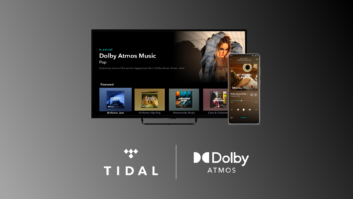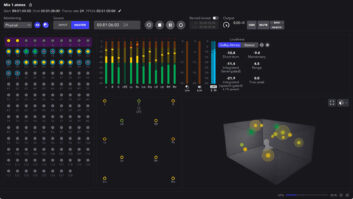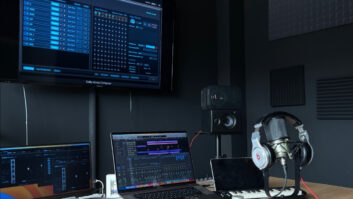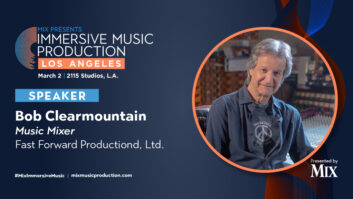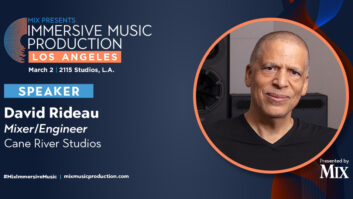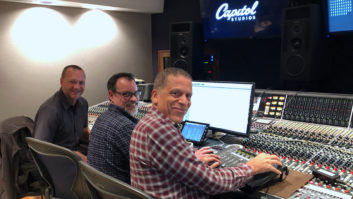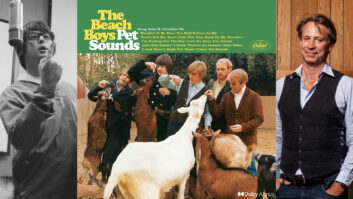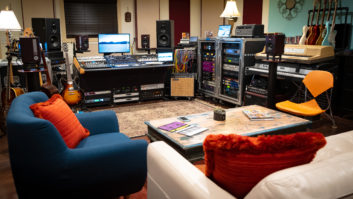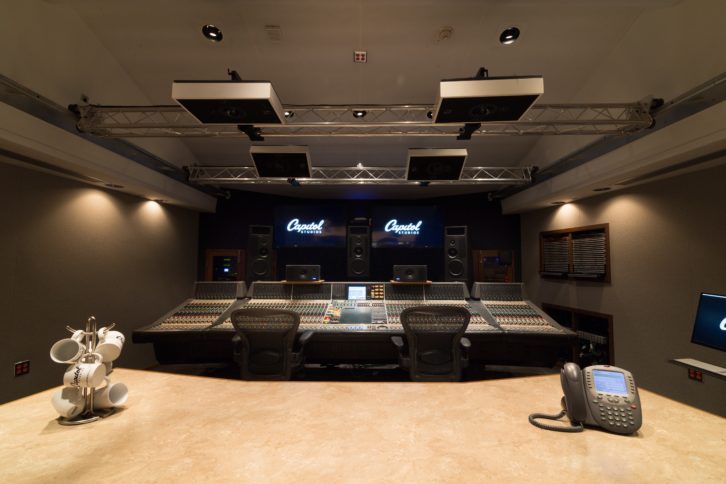
In mid-May 2017 Art Kelm, then general manager of Capitol Studios in Los Angeles, walked into Studio C and told senior engineer Steve Genewick that they would soon be converting the space, one of the industry’s most in-demand stereo mix rooms, to a full-blown Dolby Atmos Music studio. Genewick’s response was simple and to the point: “Why?” he asked.
Kelm explained that Universal Music Group, Capitol’s corporate parent since the purchase of EMI in 2012, was in the process of forming a partnership with Dolby to introduce Dolby Atmos Music to the world. Abbey Road Studios, the other UMG-owned facility, had just opened its own Atmos Music mix suite in March for a 50th anniversary release of Sgt. Pepper’s, which would be coming out in June. Capitol Studios was next.
So, Kelm told Genewick, the room would be down for a few weeks, and by the way, at the end of June they would be getting the original tracks for the 25th anniversary re-release of R.E.M.’s Automatic for the People, and Genewick would be mixing it. In Atmos. Scott Litt, the original producer, would be coming in first of August to listen to playback, so he would have a month to mix. The room would be ready. No worries.
Except that Genewick had never touched an immersive music project, and outside of the post facilities, he had no real place to learn hands-on. There had been immersive music mixes in the years prior, many of them out of Europe, many of them classical. But Genewick had no precedents to fall back on, nobody to talk to. He didn’t know the tools, had no idea of the workflow. He wasn’t quite sure of the differences between Objects and Beds. But it was coming. Soon. After the room was built.
One of the first things Kelm did was call Maurice Patist, president of PMC USA and an early adopter and avid proponent of immersive audio. Kelm and Capitol are big PMC fans, having redone Studio C just a year prior with the addition of left-right IB2S three-way main monitors. JBL had already made a big splash in Atmos for post-production with its 7 Series, but Kelm knew enough at the time to figure that the toolset, as well as the creative decisions, would be different for Atmos Music. Capitol went with PMC.
Though none of them could have known it at the time, that one week in May solidified a triangular partnership between Dolby, UMG/Capitol and PMC that essentially became two triangles. The first was a boots-on the ground team—Kelm and Genewick from UMG/Capitol, Patist from PMC, and Nathaniel Kunkel, then Ceri Thomas from Dolby, led by Christine Thomas—that over the next two-and-a-half years built three more UMG Dolby Atmos Music-certified studios, established all new workflows, and, by the end of 2019, remixed around 2000 songs.
In parallel, there was another core group on the executive side. Giles Baker was part of the team at Dolby working on the playback and distribution side, while Patrick Kraus worked with a team at UMG to get content ready, bringing in Patist from PMC when discussing the studios. Those efforts led in late 2019 to announcements with Amazon Music HD in coordination of its launch of the Atmos-enabled Echo Studio smart speaker, and with TIDAL, which announced Atmos Music as part of its Hi-Fi Tier, with a commitment to remix their own artist catalog throughout 2020 in addition to streaming UMG and now Warner Music songs,
And then they all went under radio silence for the next two years.
None of this background is meant to discount the contributions of countless others to the research into immersive music and the development of the tools and techniques that make it “something new.” There have been immersive music mixes for years, and companies like Auro-3D, DTS, Avid, Steinberg, Fraunhofer, and a number of European labels have all played their part, and they all continue to. But right here, right now, in the U.S. it’s been the triangle that put up the time, the commitment and the money.
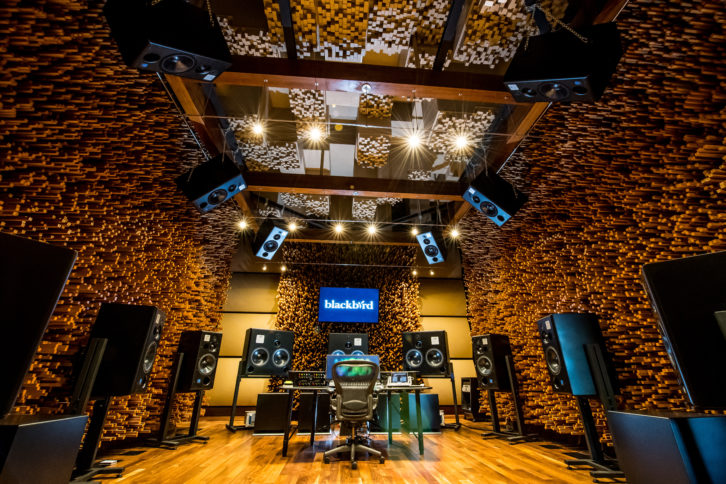
The View From 30,000 Feet
“There aren’t very many other companies out there that put together all these pieces and bridge the whole signal flow, from the creation of content through how it gets distributed and then how it gets played back by the consumer,” says Giles Baker, Dolby Senior Vice President, Consumer Entertainment, whose background includes going to recording school in England and later business school, followed by stints at Sonic Solutions, then Adobe.
“So at a technical level, we’re pretty unique, and we have always worked with partners,” he continues. “[But] we start with the artistic process as much as the technology. It’s that combination of the artistic process and vision, and the technology that we can invent, that can bring all of that to life. The starting point has to be, ‘Can you make something compelling?’”
It’s unclear at this point whether UMG first called Dolby, or vice-versa. Either way, it’s no coincidence that one month before Kelm and team started remaking Studio C, Dolby came out with the Dolby Atmos Production Suite and Dolby Atmos Mastering Suite, providing a set of tools that allowed mixers to work natively in the box and communicate with the all-important Dolby Atmos Renderer tool in software.
It’s also important to remember that by 2017, Dolby Atmos was a relatively mature technology, having taken over film and television post-production and distribution, but yet to make real inroads into the company’s other core markets: Broadcast, Music, Gaming, Live and now Streaming. Music, they knew, would have different needs and require different tools
“The cool thing about Dolby Atmos Music is that it’s a new artform,” Baker adds. “But by leveraging our presence in Dolby Atmos devices that are already out in the market, [we can] provide a way of accelerating that availability of content.”
But Dolby doesn’t make content; it’s a technology and licensing company. So if they wanted to make a splash, it made sense to partner with the world’s largest record label, one with a massive back-catalog, genre-defining labels, hundreds of artists in every style of music, and two of the most fabled recording studios in history.
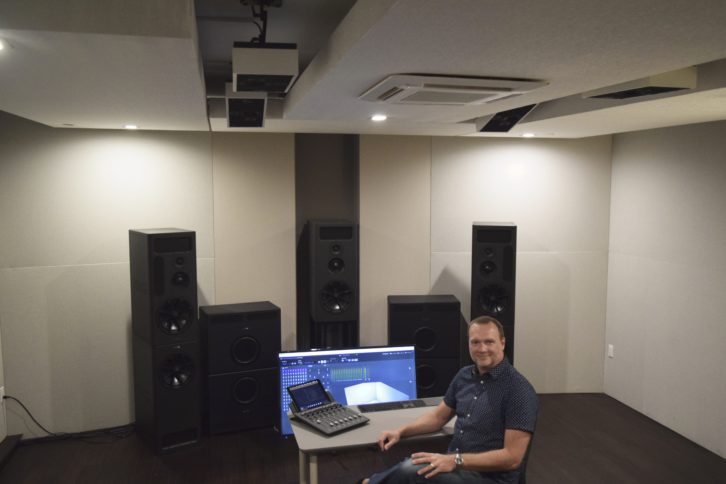
“One of the differences between music and movies or TV is that there’s a lot more music than there are movies,” Baker explains. “We can have a meaningful availability of content with 200 movies, whereas with music you need thousands and thousands of tracks. And so that dynamic is a little different. And the commitment required to get to that level of thousands and thousands of tracks—you just can’t do that on your own.”
One of the big differences between the introduction of immersive music and the failed launch of 5.1 is that the latter relied on physical distribution of albums, while the former will ultimately rely on streaming and song-based subscription delivery. UMG was certainly aware of the rapid changeover in consumption, and was at the same time looking for new ways to excite consumers, says Patrick Kraus, UMG, who has paid his dues as a recording engineer, studio manager, transfer operator, and archivist, among other titles, over his career.
“My boss, Michael Frey, who’s the president of supply chain operations and studios globally for Universal, said he’s excited about this Dolby Atmos technology in theaters,” Kraus recalls. “And he wanted to see if there was an application for it in music. He started talking to Dolby about four, maybe even five years ago. Universal is ultimately a music-based content company, and we want to make sure that we create experiences for consumers that go beyond just the stereo stream.
“In the early days, it was more about, ‘What does it mean? What’s different between music and film? I mean, sound is sound, right?’” he continues. “And then through discussions and through experimentation we would get the right people involved. As you know, one of the early adopters here was Giles Martin when he re-did Sgt. Pepper’s.
“We also felt that in order to really drive adoption and to help support this format that we needed to be the best at actually doing it right,” Kraus says. “We didn’t want to outsource all the mixing at the start because we wanted to make sure that our own rooms worked for music. But I want to make it clear that we’re not looking to hoard all of the work. This effort only works if it goes wide and far, if we get everybody to be working in the swamp.”
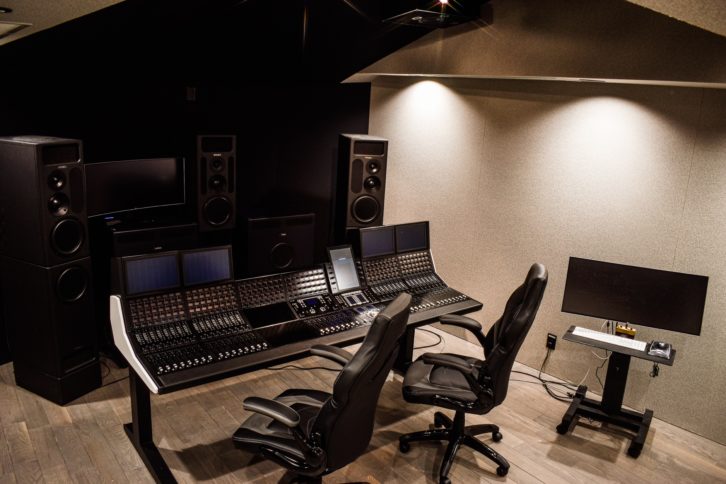
Back to the Studio
Maurice Patist at PMC was also one of those right people, with 18 years at the company and now living in Los Angeles. He’s a hardcore jazz fan, an engineer in his own right, and he has an unyielding passion for the types of musical experiences that immersive music has to offer. Of course he wants to sell speakers. He wants everyone to sell more speakers. But with support from PMC owner Peter Thomas he’s invested thousands of hours and many, many thousands of dollars over the past three years promoting the format at trade shows, popping up rooms at AES and NAMM, at Munich and Bristol hi-fi stereo shows, with a 9.1.6 system and playing back UMG content. It’s about more than selling speakers.
When Kelm called him in May 2017 to come in for another look at Studio C, and how he thought it might work with an Atmos system, Patist became a member of the team. The studios themselves were a critical part of the equation, and to get that right, the mixers had to trust what they were hearing and know that it would translate up and down the chain. Everyone knew that this would be a very different proposition than a 5.1 room. So they started with the speakers.
“it’s all in the speaker and speaker placement, and the relation to height and distance speakers,” Kelm says, emphasizing that they learned right off the bat that it would be a very different proposition than building an Atmos post-production room. “You have to get the right imaging to get the right object in motion. That’s where you really have to pay attention. Translation is everything, both between studios and eventually into the home or device or wherever it ends up.”
Over the first two weeks, Kelm, Patist and Nate Kunkel from Dolby (who ultimately was in charge of designing the system, as well as training Genewick on the mix tools) went over various options in speaker configurations, mostly trial and error, and ended up with the PMC IB2S-XBD three-ways left and right, with an IB2S-A in the center, 10 Wafer 1 (in-wall) flat-panel monitors for the surrounds, and six Wafer 2 (on-wall) models for the ceiling, the height channels. The LFE is handled by four 10-inch PMC twotwoSub2s, with two each stacked and aligned left and right of the center channel.
“When we started designing the Atmos systems at Capitol, we looked at how to place all the surround and height speakers in such a way that it voices identically with the front, and at the same time save space,” Patist recalls. “If we did it as we normally would, we ran the risk being completely surrounded by speakers—really in your face. So we brought in the Wafer flat-panels, with a 5-inch and two tweeters, and I said, ‘Well, we could take the in-wall grille off and put some acoustic fabric over it. And then we can tune and see how much we need to boost.’ This worked so well that now all the speakers for surround or height channels are completely hidden. You would never know when you walk in that there are 10 speakers behind the walls.”
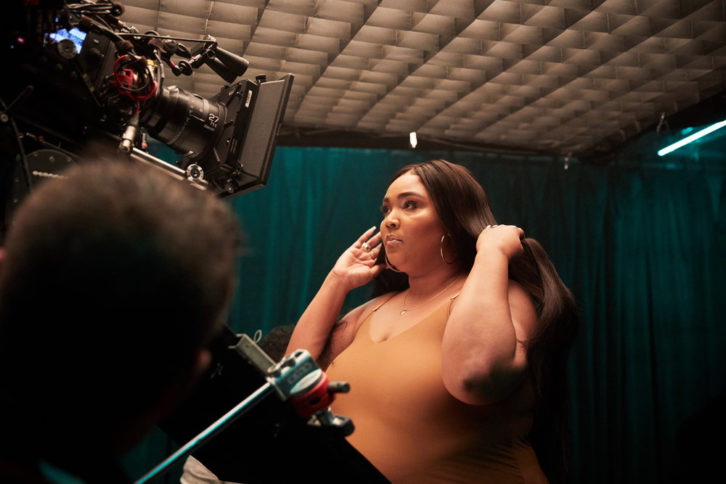
That same LCR+Sub configuration, with variations in the sides and heights based on room dimensions, has been used as the blueprint for the conversion of Studio E at Capitol and two UMG-owned rooms at the former East Iris in Nashville, along with a couple of other rooms that Patist has consulted on in conjunction with Dolby, including NYU’s Clive Davis School of Music, Shenandoah University, and his own space in Highland Park. He calls what they came up with the Capitol Blueprint. And it works.
The Studio’s Open, Time to Mix
While Kelm, Patist and Kunkel moved on to the next rooms and their other day jobs, Genewick started figuring out how to mix in a whole new way. Kunkel sat down with him for a day to get him familiar with the Renderer and the toolset, and to go over the differences between channel-based mixing and working with Beds and Objects. And then it was time to start on Automatic for the People. Today, Genewick still laughs as he says, “I had no idea what I was doing. It was a huge learning curve.”
A couple of things he did learn, pretty quickly, was that the original plan to have a hybrid analog and digital workflow became an all-digital chain, down to the Focusrite-driven Dante network, a technology Kelm says is absolutely necessary for this type of room. So Genewick had to learn Dante, too.
“I knew about Dante, but I hadn’t sat in front of it.,” he says “And it all sounds great until you’re staring at the screen going, ‘I don’t know how to get this to go there.’ I understand a patch cable, but this is crazy! But it’s like anything else You just learn it and do it.”
He has also, over months and months of mixing, learned much more about object-based mixing and translation. “I use a lot of objects and very little bed,” he explains. “And the reason for that is that I started noticing that audio would appear when I didn’t really put it there, especially on the side and in the ceiling. I thought, ‘Why is that moving? I put it over there, why is it suddenly here?’ And I realized it was because I was using the bed, and everybody’s speaker configuration can be a little bit different, especially in the sides and the ceiling.
“So long story short, I came up with a series of zones, I call them. Basically I have 25 static objects set up in different parts of the room—front side, side farther back, rear, high front, high middle, high back, stuff like that. Those objects never, ever move, and I have them set up on aux sends in Pro Tools. When I sat down to do R.E.M., I figured that I had all this cool space, I should use it!. I could do all this fun stuff and moving guitars and all that. But I learned early on that I still have to make a record that people want to sit down and listen to.”
Genewick went through a similar process figuring out how to work with reverb, coming up with a scheme whereby he assigns seven instantiations to dedicated zones, then one big mono reverb over all of them. One send feeds all the reverbs. “Then I came up with this system where I put delays in front of all the reverbs so it kind of spills through the room a little bit. Those early days were all about learning how to use space, learning how to build spaces, and then finding out how different elements react.”
While back then he had to create his own workflow technically and adapt his mix approach philosophically, Genewick was soon able to share ideas with other UMG staff engineers, including most notably Greg Penny, Nick Rives and Colin Heldt, who would eventually become the core group that remixed most of the initial catalog and new-artist tracks.
And the first R.E.M. Dolby Atmos Music mix? How did that go when he played it back for Scott Litt? “Well, [pause] I had mixed the record the way I heard it and the way it came to me naturally,” he says with a laugh. “And Scott’s a sweet guy, and very polite, but I came to realize very quickly that what he had going on in his mind and what I had in my mind were not exactly lining up, conceptually and space-wise. He brought in the original engineer, we spent a few more days, Nick Rives helped finish it up when I had to go onto another project, and it all turned out well.
“I learned that day, though, that whenever at all possible, it helps to sit down with the artist, the original producer or engineer, whoever you can. It helps to have a philosophical discussion. It’s their record. It’s their vision.”
Challenges and Critics
In 2019, then, before the fall announcements with Amazon and TIDAL, word started to trickle out in the studio community about all these Atmos remixes that had already been done and a commitment for much, much more by the end of the year. Then came the Amazon and TIDAL announcements, so now streaming was in the game.
Not everybody was happy, including some of those original engineers and producers who were not consulted and then found themselves listening to a remixed version of a song they mixed at some private event or listening party. Some were aghast, and blamed UMG for being greedy, for rushing out quantity and not caring about quality. And the mix rates per song were all over the place, they said, as were the schedules for mix time.
Critics say that Dolby is using its muscle to take over the immersive music industry, as it did in cinema and broadcast, bullying out competitors who have been working just as long and just as hard and have a slew of great immersive mixes already in distribution, on Blu-ray disc, a superior playback medium.
And then once the TIDAL and Amazon deals were made, it became clear that access would not be as easy as it might seem. Atmos Music tracks on Amazon Music HD only play back Atmos Music if played through an Amazon Echo Studio at this time. And the TIDAL Hi-Fi Tier service will only stream Atmos Music tracks on a limited number of Android phones. It’s a challenge, a difficult one, and we are still at the beginning. It turns out there is a lot that goes on in the background to get these streaming services up and running and Dolby is working closely with its partners to bring Atmos Music to more people. But the fact remains that the streaming services have an element of control over distribution. Why is it difficult to hear an Atmos Music track?
All of these criticisms have a measure of validity. And let’s face it, the recording and music industries have a pothole-ridden history with accepting new formats. it still is the music business, and there are undoubtedly conversations going on with Spotify, Apple Music, Pandora, HD Tracks and every other premium streaming service. Hopefully that all gets worked out.
And as for why this is any different than the introduction of 5.1 music, well, there are too many to list, starting with the physical limitations of the speaker setup in a channel-based system. Audio as Objects changes everything. Put simply, Art Kelm says, “Technology is now our friend.”
It’s important to remember that immersive music is still in its infancy, artistically and technologically, from the studio down to the home. Right now many, including Sony RA360 and Dolby themselves, are betting the bank on the Binaural setting in the Renderer, knowing that a vast majority of consumers will be listening on headphones.
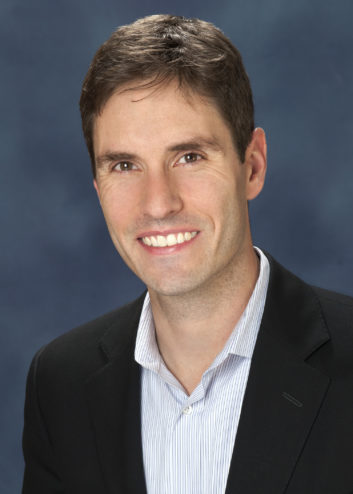
Listening to music in Dolby Atmos, or any immersive format, is exciting. Mixers are having fun, finding new ways to present an artistic vision. But it truly is something that needs to be experienced to get the full effect, and once the wrinkles are worked out and it becomes part of the production process, that will happen. Dolby Atmos took off in television almost overnight once Netflix, Prime Video, Apple TV+, Disney+ and others made it a required deliverable. If that could happen in music…
Give it time. As Giles Baker of Dolby points out, a lot of stars have to align in order for something like Dolby Atmos Music to catch hold. And he firmly believes that it will.
“There are four key things that need to be present in order for us to feel like we have a healthy ecosystem,” he says. “First, do we have enough content being created? Second, is that content being distributed on services that people can get? Third, is it available on devices that people have? And then the fourth piece, is there buzz around it? Do consumers want this? Are content creators excited about creating it, and are they telling the world? If you can get all of those pieces in place and they’re working positively, they start to reinforce each other. And then you have the change.”
More Dolby Atmos Music Studios
Capitol Studio C wasn’t the first immersive music room in the country, but when it quietly opened in 2017, you could probably count the number on one hand. Now there might be 10 to 15 that would qualify as high-end mix rooms. It’s hard to find a real number. Suffice to say that it’s growing.
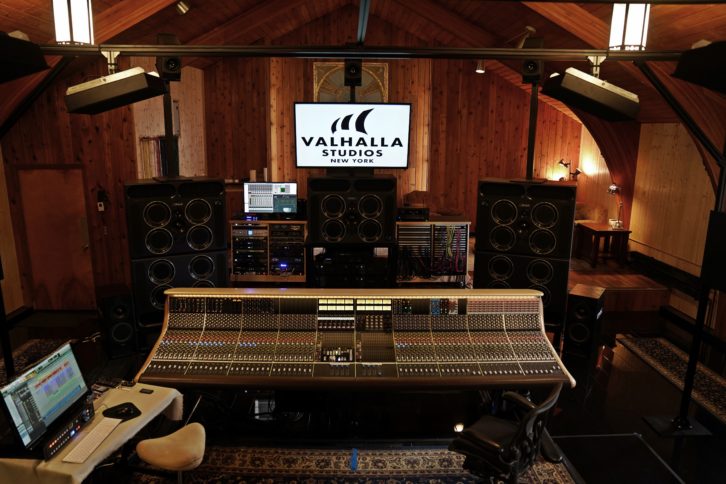
UMG/Capitol went on to build two more Atmos Music rooms in Nashville’s former East Iris Studios, while at the same time outfitting Studio E back at Capitol in Los Angeles. Emotionmix built a room, also in Nashville. And then in August 2019 John McBride converted his famed Studio C at Blackbird Studios, just down the street from the two UMG Atmos rooms at East Iris, and put in an ATC monitoring system.
Back in Los Angeles, IMN and Studio1LA opened smaller Atmos mix facilities, while in New York, the Clive Davis School of Music recently finished the build-out of two Atmos Music mix rooms, followed by Shenandoah University in Georgia, each school with PMC monitoring.
In late 2019, Ronald Prent and mastering engineer D’Arcy Proper opened Valhalla Studios in Auburn, N.Y., based around Paul Wolff’s new analog Fix 360 analog console and PMC monitors. John Hanes and Serban Ghenea installed a Genelec Atmos Music monitoring system in their MixStar Studios in Virginia Beach, Va.
And in the San Francisco Bay Area, Leslie Ann Jones at Skywalker Sound modified the Scoring Stage control room for recent projects with a truss-based system incorporating B&Ws across the front and Neumann KH220s for height and surrounds. Michael Romanowski, in Berkeley, has been mastering on a 9.1.6 system with Focal speakers across the front and in the surrounds, with Neumanns up above, in his recently re-opened Coast Mastering.
No doubt there are many more, and no doubt many more will be coming. Please write to let Mix know of your own immersive music studio.
